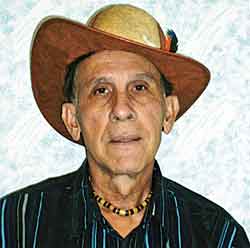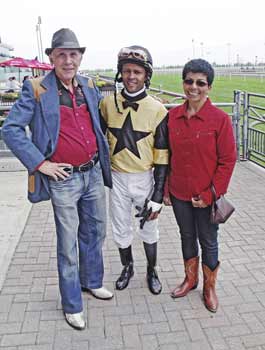June 1, 2011 issue
Arts & Entertainment
Bets off on being a gambler
for the horses

I have always had a fascination with horses. My earliest recollection of a toy is me sitting on a wooden rocking horse at home, rocking to my heart's content. Later on when I was four or five, my father took me to Durban Park on Vlissengen Road in Georgetown to watch horse racing. There I saw horses with names like Vindema, Runaway, Gallant Man and Broken Arrow. Race day was alwaya an exciting event. Held on a Saturday, a kind of fever gripped people. The

spectators were noisy and animated, the jockeys bright and colourful, the grounds filled, and Radio Demerara giving regular commentary on each race. Lloyd Luckoo was the announcer.
I never went into the stands. According to my father, only folks with money sat there – lawyers, doctors, politicians, colonial officials and the "high brow" of British Guiana. Even the Governor came by on occasion. My father called them all "big sahibs".
I walked around the grounds with my father, onto the road, around the bends in the track, by the church - St. Sidwell's turn, I believe it was called. There was gambling, and drinking, talk and loud laughter all around.
Later I attended races at the Garrison in Barbados and in Trinidad. I became familiar with jockeys such as Chally Jones (Barbados), Emile Ramsammy (Trinidad) and Patrick Husbands (Barbados). It was my good fortune to meet Patrick Husbands at the Woodbine Racetrack in Toronto last Saturday, after he had won a race. I also met Sunny Singh who is a jockey who comes from Guyana.
I am not a gambling man but it's the horses and the races – the colour, the energy, the excitement that brings me to the track. The buzz of the crowd, the ground pounding, flying dirt, the crowd's roar, the jockeys' whips cracking, the final furlong, the homestretch, all out effort and in the end winners and losers – more losers than winners. It's about all a boy or a man could ask for.
There is drama, and tension, the horses in a lather and sweat, some nostrils bleeding with the effort, animals making their greatest effort to win. In the end, the smiling jockey and trainer, the proud owners, the flashing photographers, newspapers and T.V. cameras and reporters, and my heart pounding, pounding, pounding….
This last weekend I had the joy and privilege to visit the track at Woodbine in Toronto. It was as guests of some friends of my wife and I who own thoroughbred horses that race at Woodbine and in the United States. This time I got to sit in the stands. The old Woodbine Race course was on Woodbine Avenue in Toronto, The new Woodbine opened in 1956 in Rexdale, Toronto. Famous horses like Northern Dancer and famous jockeys like Sandy Hawly come to mind.
The crowds in the stands at Woodbine are reportedly not as large as they used to be. With TV, computers, home betting, and betting shops, it's not necessary to go to the track. Traffic, parking and the price of gas is also a damper. But if you do go, there is lively excitement waiting for you.
There are different areas of the stands, depending on your pocket book. There is room for the poor to the high and mighty. At the upper levels of millionaires and multi-millionaires, there seems to be even further stratification. Horse racing has been called "the sport of kings" and as a horse owner pointed out to me, "it's for people who have money to lose".
My wife and I thoroughly enjoyed the day with our friends (horse owners). We got to see the paddocks where the horses are kept. We met the trainers and grooms and jockeys and got an insight into life behind the scenes at the race track.
The horses scheduled to run on race day seemed to know it. They tended to be more tense, skittish, alert, fussy and jumpy. They are apparently not given a big meal before a race and are supposed to be resting before the big event. After the race, they can have a large meal and a long rest to recuperate. The effort of a race takes over 30 pounds off each horse!
Before entering a race, the horses are examined by a vet and declared fit to race. The jockeys show up at the track and try to relax, work out, and get final instructions for the race. Then they get dressed and weigh in. Their weight has to be a hundred percent accurate. A difference of one pound less could result in four lengths at the finish of a race. Each number has a special saddle colour – I: red, 2: white, 3: blue, 4: yellow, 5: green, 6: black…The jockeys wear the colours of the horses' owners.
The spectators and jockeys I saw at Woodbine were very multicultural. I heard a number of West Indian accents. In fact many of the staff and workers also seemed to be of Caribbean origin. The horses assemble in the saddling area before each race and there the jockey mounts his/her horse. Yes, there are female jockeys. This provides the public a last chance to see the horses close up before they bet.
The bugler dressed in red and black blows his bugle to announce the race. The horses parade by the grandstand and then go off to the starting gate. There they are corralled into their post position starting at number 1, by the rails. Each position is randomly determined by drawing. Horses apparently don't like to run next to the rails where they feel pressured and boxed in.
Then they are quickly out of the starting gates and off. There is always some drama in a race, be it a short one of five furlongs or a long one of a mile or more. There are stewards to watch the race and re-examine the tape after it's over to make sure there is no "foul play". The owners and trainers are particularly tense.
In the end there are winners and losers. As an owner, you would like your horse to win or at least place or show. To come last is depressing. You also want your jockey and horse to be safe. The jockeys try their best but the horses are the real heroes. They are very brave, loyal and responsive. They show a lot of heart, sometimes going beyond their limits. Horses have been called the perfect athlete. Some even die on the track. Reaching speeds of 40 miles an hour or more, the jockeys also have to be brave and professional. After a race, the jockey may have to be weighed again, the horse tested for illegal substances.
I did ride a horse once on a trail ride. I was both scared and impressed by the height of the horse and the power below me. That's where the term "Horse power" comes from.
On a sad note, after a horse has given its all, it may not have a suitable home to retire to. It may be sold off, abused, auctioned off and butchered for horse meat, who knows. Those more successful at racing could end up with a harem. Some horses have made millions for their owners; some have led others to financial ruin.
The cowboy, the race track, the circus, the farm and fair are all the horse's domain with many tales to tell. Many people say that a dog is a man's best friend. That may be so perhaps because they do not really know horses. I believe that a horse may in fact be man's best friend. If the creeks don't rise and the sun still shines I'll be talking to you.
Annual Golf Tournament
MET College of Guyana Alumni Association (Canada) will hold its 8th Annual Golf Tournament on Saturday June 18th, at the Remington Parkview Golf & Country Club, 6400 Steeles Avenue East, Markham (North of Steeles, East of Markham).
Hole in One Prize - Mazda Rx-8, sponsored by Ajax Mazda. Proceeds of the tournament will go to: Three Rivers Kids Foundation, Seneca College Scholarship Trust, Caribbean Childrens' Foundation, Youth Literacy workshop (Toronto), Peel Memorial and Princess Margaret Hospitals, Disaster Relief in Guyana, Grenada, Indonesia, Kashmir, New Orleans and Haiti, Christian Charities. Info: Shaw Jaundoo 647-406-7429; Nizam Bacchus 905-420-1985; Lita Laborde 416-444-3242; Mobeen Husain 905-578-2905; Faz Mohamed 905-837-2857 Gloria Pierre 416-756-4926; Kenny Deally 416-578-6182.